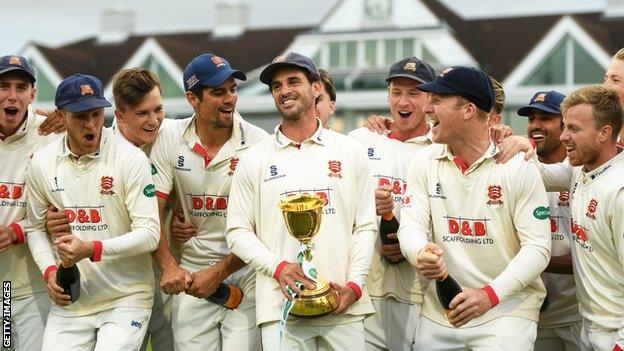Cricket and coronavirus: What will happen with 2020 season?
- Published
- comments

An England side featuring Ben Stokes are scheduled to play six Tests this summer
The coronavirus lockdown has hit the UK just as fans and players of all levels of cricket were gearing up for a new season.
Across the globe, there has been no major action in any form of the game since 16 March, the longest gap between matches in 37 years.
With so many questions about this summer, we look at the problems that could arise, possible solutions, and what is happening elsewhere in the cricketing world.
When might we see some cricket?
There will be no professional cricket in England or Wales until 28 May at the earliest, which is a significant date for a couple of reasons.
First, it is supposed be the opening night of the T20 Blast and it also the first day of West Indies' last scheduled tour game before the first Test against England, which is due to begin on 4 June. More on both of those later.
The England and Wales Cricket Board (ECB) is working on revised schedules for the season to begin in June, July or even August, and is focusing on four key areas - public safety, the most financially important formats of the game, deals with broadcast partners and supporting the women's game.
The May target was first mooted before the government's restrictions on social distancing were tightened, so they would have to be lifted sufficiently for players to return to training before that date.
What about England?
Any speculation over when or if international cricket will take place comes with the assumption that overseas teams will both want to travel and be allowed into the country.
The 28 May date is only a week before England's first Test against West Indies is due to begin, which clearly leaves little time for the teams to prepare.
Cricket West Indies chief executive Jonny Grave has said his side would play without a warm-up game if required, but England fast bowler James Anderson thinks seven days would not be enough preparation time.
If the start of the season is pushed back further than the end of May, the ECB will do all it can to reschedule the lucrative international matches, but that involves juggling four visiting teams - West Indies, Pakistan, Australia and Ireland.
With Australia and Ireland only playing limited-overs matches, it could be possible for different England Test and one-day teams to play simultaneously.
However, Australia and West Indies have other international dates around their trips to England, and in the case of the Windies, their Caribbean Premier League is set to take place in August and September.
If the three-match West Indies series or the three Tests against Pakistan are cancelled, the chances of the World Test Championship being completed in time for the scheduled final next year are starting to look remote.
England have already had two Tests in Sri Lanka postponed and, although they could perhaps be slotted into a winter that includes a T20 World Cup and a tour to India, it is hard to see how any lost home series could be rescheduled without dismantling the plans for future summers.
And the domestic game?

Essex are the defending county champions
There are two parts to the way the domestic summer is being affected: the County Championship and the limited-overs competitions.
We'll deal with the latter first, because the T20 Blast and the inaugural season of The Hundred are the priorities of the ECB when it comes to keeping the 18 counties solvent.
While The Hundred is not due to start until July, the challenges facing the nascent competition are beginning to mount.
The new tournament would have been pushed and marketed heavily in the early part of the summer, crucial promotional time that is now set to be lost. Early-April dates for when more tickets were due to go on sale were postponed on Monday.
Not only that, but The Hundred was set to have a heavy overseas influence, both through players and coaches, who may not be able to take part.
That problem is magnified in the women's version of The Hundred, where the eight teams are even more reliant on the imports.
This could all mean that the Blast, pushed to the margins by The Hundred, is actually more likely to take place.
It would be easier to hold the Blast at short notice, not least because counties can field teams without the overseas players, but because it is already well established with its audience.
If there is only time for one of those short-form competitions to take place, expect it to be the Blast.
As for the County Championship, seven rounds of four-day matches were lost with the initial delay to 28 May. For every day of the season that is lost, the greater the chance there will be no first-class cricket in England at all this year.
If there is a reasonable amount of time for cricket to be played, the Championship could perhaps run alongside The Hundred, taking the place of the One-Day Cup, the downgraded 50-over competition.
However, a full season seems almost impossible and former England captain Alastair Cook, opener for defending champions Essex, believes it would be better to scrap the Championship entirely, rather than play a dramatically shortened version of it.
As ECB chief executive Tom Harrison said this week, "all scenarios are on the table".
What about the rest of the world?
Most significantly to the wider cricketing world, the Indian Premier League (IPL), one of the most watched sporting competitions on the planet, has already had its start delayed from 29 March to at least 15 April.
With India now in lockdown until 14 April, that start date seems unlikely and, even if the competition does get under way, will its galaxy of overseas starts be able to travel?
On Monday, Rajasthan Royals owner Manoj Badale suggested the tournament could be played later in the year, but that would have a knock-on effect for most other nations, who would be concerned about losing their players at a time when they have their own fixtures scheduled.
The IPL is adept at dealing with problems, though. In 2009, the entire competition shifted to South Africa because of security concerns.
The Pakistan Super League got as far as the semi-finals before it was called off,, external with the intention to play the final three matches another time. When that would be, in a crowded calendar, is up for debate.
As major sporting competitions originally scheduled for 2020 fall one by one, the men's T20 World Cup in Australia in October and November remains on the calendar.
Anything else?
Coronavirus is not just affecting the professional game. There are thousands of amateur cricketers wondering if they will pick up a bat or ball this summer.
The ECB has suspended all recreational cricket activity indefinitely, plunging a host of grassroots clubs into a period of uncertainty.
Some may wonder about the implications of losing summer revenue - match fees, tea money, bar takings - while others will have signed overseas professionals and have no idea whether they can or should travel to the UK.
There are leagues that have already opted to cancel promotion and relegation in 2020, with others deciding it is too early for such a move. The ECB is in regular contact with Premier Leagues, the highest standard of weekend cricket in the country.
On Sunday, England's deputy chief medical officer said it could be six months until life returns to normal.
Anyone hoping to watch, listen to, follow or play cricket will be thinking that could wipe out their entire summer.
It could, but the planet faces bigger problems than the impact on a game of bat and ball.